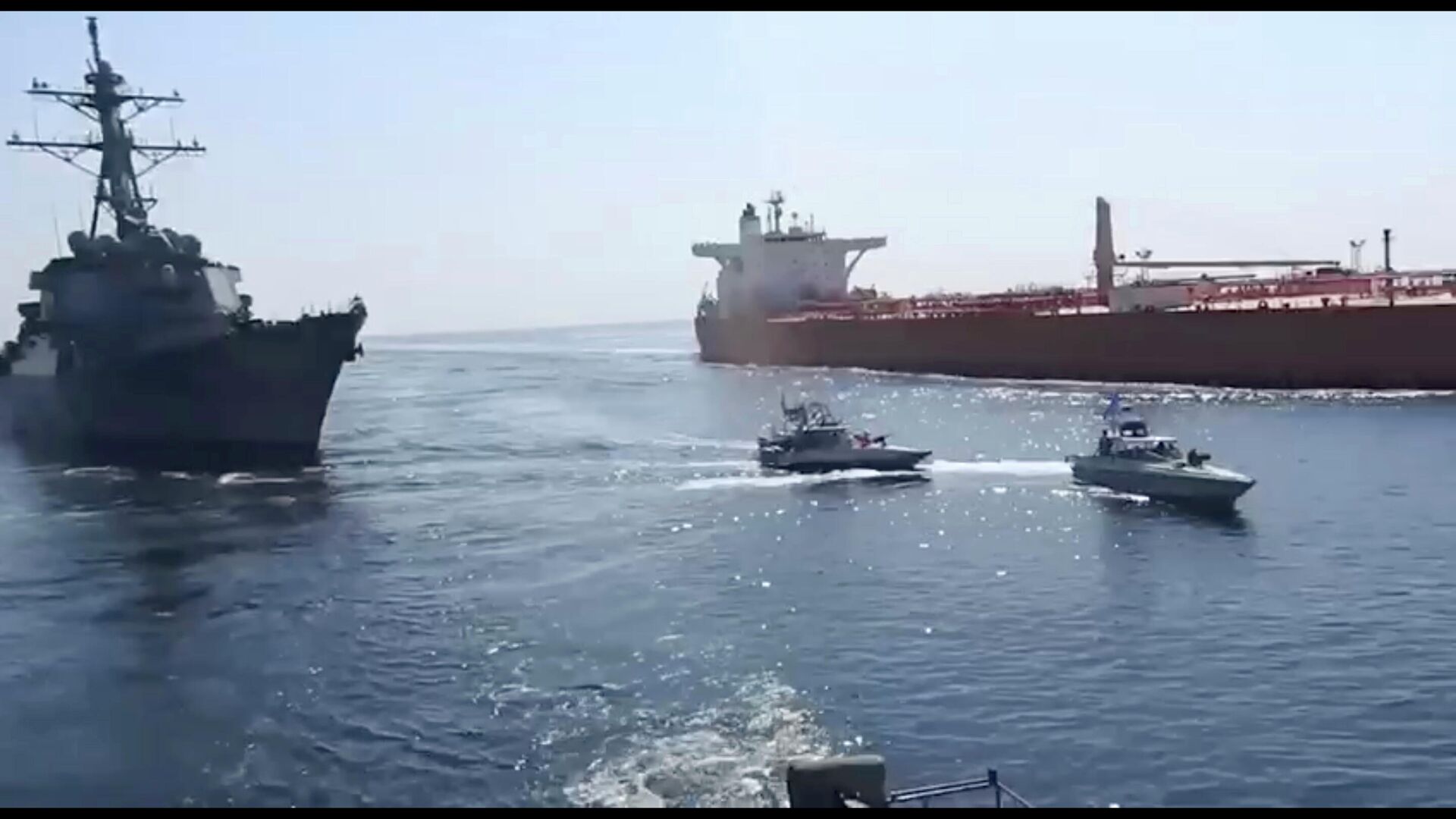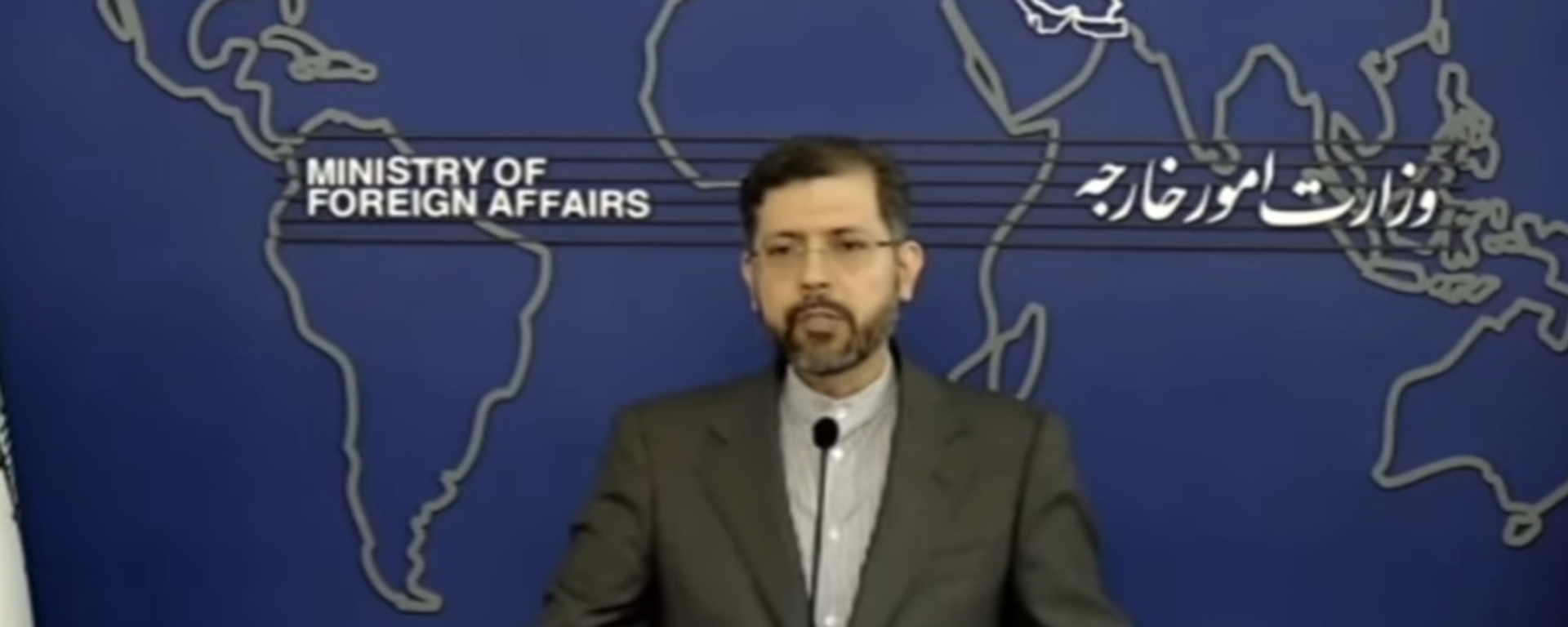https://sputnikglobe.com/20220529/iran-responds-in-kind-to-greek-seizure-of-oil-tanker-expert-says-nuclear-deal-chances-decreasing-1095855356.html
Iran Responds in Kind to Greek Seizure of Oil Tanker, Expert Says Nuclear Deal Chances ‘Decreasing’
Iran Responds in Kind to Greek Seizure of Oil Tanker, Expert Says Nuclear Deal Chances ‘Decreasing’
Sputnik International
As Iran retaliates to Greece’s decision to ‘rob’ its oil shipment from a Russian tanker this week, Sputnik spoke with one Middle East analyst who says the... 29.05.2022, Sputnik International
2022-05-29T04:11+0000
2022-05-29T04:11+0000
2023-07-31T16:59+0000
iran oil
greece
iran
oil tanker
kyriakos mitsotakis
alexis tsipras
iran nuclear deal
https://cdn1.img.sputnikglobe.com/img/07e5/0b/04/1090470054_0:90:2880:1710_1920x0_80_0_0_d5ee11141566e1a915bae1fe48b5e2a0.jpg
The Iranian government seized two Greek tankers in the Persian Gulf, it announced Friday, in response to the seizure of around 700,000 barrels of Iranian oil by Greek authorities acting on behalf of the US this week.Iran’s Ports and Maritime Organization said Saturday that “two Greek ships have been impounded for now” and dismissed reports that the crews were detained, saying the ship’s workers were “safe and sound” onboard their ships and “being protected in accordance with international laws and offered required services.”Iranian Foreign Ministry Spokesman Saeed Khatibzadeh confirmed that “tanker crews are safe and in good health” and described the seizures as a response to a “deeply shortsighted miscalculation” in a statement Saturday which expressed hope that Greco-Iranian ties wouldn’t be “hampered” by what he described as Greece’s “highway robbery on the command” of the US.Greece described Iran’s moves to impound the Delta Poseidon and Prudent Warrior as “tantamount to piracy” in a Friday statement that did not mention Greece’s seizure of around 700,000 barrels of Iranian oil from a Russian-owned tanker earlier in the week on behalf of the United States. The two Suezmax tankers confiscated by Iran were reportedly loaded with nearly a million barrels each and had recently departed from Iraq's Basra oil terminal.Cafiero warned Sputnik News that “there is good reason to conclude that the chances of the JCPOA being revived are decreasing” as the back-and-forth tanker seizures “increase friction between the Islamic Republic and the West.”Ties between the United States and Iran have been largely hostile since 1979, when the Iranian revolution overthrew the CIA-installed Shah Mohammad Reza Pahlavi, but Iran and Greece have historic ties stretching back thousands of years.Following Greece’s sovereign debt crisis, the Mediterranean nation leaned heavily on the Islamic Republic for energy when its European neighbors proved unwilling to assist. According to Reuters, “Greece relied on Iran for more than half of its oil imports during some months [in 2011] after traders and oil majors pulled the plug on supplies and banks refused to provide financing for fear that Athens would default on its debt.”In 2016 Greece’s then-Prime Minister Alexis Tsipra was the first Western leader to travel to Iran following the signing of the nuclear deal, and he expressed hopes that his country would become the Islamic Republic’s economic bridge to Europe. However, ties between the states have largely soured since, especially under the administration of Kyriakos Mitsotakis, who sparked a diplomatic incident with his Iranian counterparts in 2020 by declaring Greece's support for the US assassination of Qasem Soleimani.
https://sputnikglobe.com/20220527/iran-condemns-blatant-piracy-as-us-seizes-oil-tanker-dealing-blow-to-nuclear-deal-chances--report-1095813505.html
greece
iran
Sputnik International
feedback@sputniknews.com
+74956456601
MIA „Rossiya Segodnya“
2022
News
en_EN
Sputnik International
feedback@sputniknews.com
+74956456601
MIA „Rossiya Segodnya“
Sputnik International
feedback@sputniknews.com
+74956456601
MIA „Rossiya Segodnya“
iran oil, greece, iran, oil tanker, kyriakos mitsotakis, alexis tsipras, iran nuclear deal
iran oil, greece, iran, oil tanker, kyriakos mitsotakis, alexis tsipras, iran nuclear deal
Iran Responds in Kind to Greek Seizure of Oil Tanker, Expert Says Nuclear Deal Chances ‘Decreasing’
04:11 GMT 29.05.2022 (Updated: 16:59 GMT 31.07.2023) As Iran retaliates to Greece’s decision to ‘rob’ its oil shipment from a Russian tanker this week, Sputnik spoke with one Middle East analyst who says the chances of a positive outcome to negotiations over a nuclear deal restoration are growing increasingly slim.
The Iranian government seized two Greek tankers in the Persian Gulf, it announced Friday, in response to the seizure of around 700,000 barrels of Iranian oil by Greek authorities acting on behalf of the US this week.
Iran’s Ports and Maritime Organization said Saturday that “two Greek ships have been impounded for now” and dismissed reports that the crews were detained, saying the ship’s workers were “safe and sound” onboard their ships and “being protected in accordance with international laws and offered required services.”
Iranian Foreign Ministry Spokesman Saeed Khatibzadeh confirmed that “tanker crews are safe and in good health” and described the seizures as a response to a “deeply shortsighted miscalculation” in a statement Saturday which expressed hope that Greco-Iranian ties wouldn’t be “hampered” by what he described as Greece’s “highway robbery on the command” of the US.
Greece described Iran’s moves to impound the Delta Poseidon and Prudent Warrior as
“tantamount to piracy” in a Friday statement that did not mention Greece’s seizure of around 700,000 barrels of Iranian oil from a Russian-owned tanker earlier in the week on behalf of the United States. The two Suezmax tankers confiscated by Iran were reportedly loaded with
nearly a million barrels each and had recently departed from Iraq's Basra oil terminal.
“These tensions between Greece and Iran need to be seen within the context of the tense relationship between Washington and Tehran, especially considering the extent to which Greece’s actions are assisting Washington’s agenda against Iran,” said Giorgio Cafiero, CEO of Gulf State Analytics, a Washington-based political risk consultancy.
Cafiero warned Sputnik News that “there is good reason to conclude that the chances of the JCPOA being revived are decreasing” as the back-and-forth tanker seizures “increase friction between the Islamic Republic and the West.”
Ultimately, “both Iran and Western countries are showing their willingness to resort to more coercive means to advance their interests, which undermines the potential for tensions to ease through some diplomatic breakthrough in Vienna,” Cafiero said.
Ties between the United States and Iran have been largely hostile since 1979, when the Iranian revolution overthrew the CIA-installed Shah Mohammad Reza Pahlavi, but Iran and Greece have historic ties stretching back thousands of years.
Following Greece’s sovereign debt crisis, the Mediterranean nation leaned heavily on the Islamic Republic for energy when its European neighbors proved unwilling to assist. According to Reuters, “Greece relied on Iran for more than half of its oil imports during some months [in 2011] after traders and oil majors pulled the plug on supplies and banks refused to provide financing for fear that Athens would default on its debt.”
In 2016 Greece’s then-Prime Minister Alexis Tsipra was the first Western leader to travel to Iran following the signing of the nuclear deal, and he expressed hopes that his country would become the Islamic Republic’s economic bridge to Europe. However, ties between the states have largely soured since, especially under the administration of Kyriakos Mitsotakis, who sparked a diplomatic incident with his Iranian counterparts in 2020 by declaring Greece's support for the US assassination of Qasem Soleimani.


